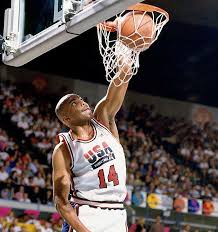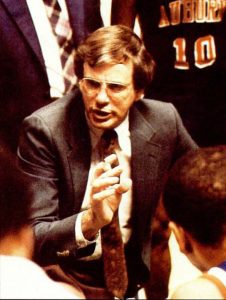The NBA Finals date back to 1947 (when they were known as the Basketball Association of America Finals) and the very 1st NCAA tourney was held in 1939. Olympic basketball competition is even older: it debuted as a demonstration event in 1904 and the men’s version became a medal sport in 1936, with the women finally getting their chance to go for the gold in 1976. The United States has dominated Olympic basketball competition from the start: the men have won 15 gold medals in the 18 tournaments they have participated in during the past 84 years, while the women have won 8 gold medals in the 10 tournaments in which they have competed during the past 44 years. Those of you who were looking forward to the 2020 Olympics opening ceremonies in Tokyo on July 24, 2020 will have to wait an extra 364 days, as the coronavirus caused a postponement until July 23, 2021. Due to the absence of college basketball since mid-March, HoopsHD’s Jon Teitel decided to fill the void by trying to interview as many prior Olympic players/coaches as possible so that you have something to read this summer while not watching the Summer Games. We continue our coverage by chatting with former Auburn coach Sonny Smith about Charles Barkley winning a pair of gold medals in 1992/1996. Today marks the 27th anniversary of Barkley having 42 PTS/16-26 FG/13 REB for Phoenix in a loss to Chicago in Game 2 of the 1993 NBA Finals.
Barkley grew up in Leeds, AL, where he was a 5’10” player who did not make his high school varsity team as a junior: how did you recruit him to Auburn after 1 of your assistants reported seeing “a fat guy who can play like the wind”? There was a teacher at his high school who was friends with 1 of my assistants (Herbert Greene) when they were both students at Auburn. Herbert was in on Charles 1st because of his size at the time.
He led the SEC in rebounding during each year of his college career and in 1987 he became the shortest player to ever lead the NBA in rebounding with 14.6 RPG: what made him such a great rebounder? I was supposed to be pretty good at post play/rebounding so evidently we taught him well but he taught me as well. He was a touch-and-go guy who did not want to block out but he could pursue the ball on either side of the court better than anyone I have ever seen.
In 1984 he led the Tigers to their 1st NCAA tourney in school history and had 23 PTS/8-10 FG/17 REB in a 1-PT loss to Richmond: how on earth did you lose to the Spiders while having Barkley/Chuck Person on your squad? They were both pretty young at the time but Richmond had a great coach who prepared for us very well. We played a lot of zone defense and they had Johnny Newman making a lot of deep shots (26 PTS/11-22 FG). They had a skinny 6’10” guy who guarded Charles well in the 1st half and we did not get him the ball enough. Charles worked harder to get open in the 2nd half and destroyed them. We had 5 highly-recruited players so I tried to run set plays for all of them. It was not a case of not respecting them: they had as good a team as we did.
In 1984 he was named All-American/SEC POY and he was later was named SEC Player of the 1980s by the Birmingham Post-Herald: what did it mean to him to receive such outstanding honors? I thought that he was going to receive those honors. I think it was satisfying to him but I do not think that he was surprised.
In the summer of 1984 he was drafted 5th overall by Philadelphia: did he see that as a validation of his college career, or the realization of a lifelong dream of reaching the NBA, or other? He left after his junior year because he felt that he was ready. I selfishly thought that he would be even more ready if he spent 1 more year at Auburn but I knew that he would be fine. I was not sure how high he would go because I was unsure how the NBA viewed him but our arena was full of scouts by the time he got rolling.
After being traded to Phoenix in the summer of 1992 he was named 1993 NBA MVP after and leading the Suns to their 1st NBA Finals appearance since 1976: how proud were you to see a player who used to weigh 300 pounds improve enough to be named the best player in pro basketball? I am extremely proud of him. I knew how good he could be: I once told Moses Malone that if he could convince Charles to lose some weight then he would become a great player. Charles never thought that he needed to lose a ton of weight but got some good training to build some muscle. We have a statute of him here at Auburn: I was hard on him back in the day and he told me during the unveiling that if he had an OJ jury then he would have killed me 30 years ago! He also told the crowd that there were some months when he thought his name was “SOB” because that is all I called him. I got on him to lose weight and feared the NBA might not take him due to his height but he could outrun anyone on the floor. There are not many bottom-of-the-pack guys who get to coach superstars: I was an old-school guy who treated everyone the same but superstars need to be treated differently. Hounding them does not get the best out of them: we would have done even better had I treated him like a superstar. When I see star players today in NBA huddles ignoring their coaches I realize that it has become the norm. If you watch a guy like Kentucky coach John Calipari you can see that he knows how to handle his stars.
He won gold medals at the Olympics in 1992 and 1996: what did it mean to him to represent his country, and what did it mean to him to win a pair of gold medals? I think that he understood what he was capable of doing even more than the people around him did. He was very self-driven and did not need to be pushed. Once he got into better shape he became much better: most superstars get better as they get older.
He was named to the NBA’s 50th Anniversary All-Time Team in 1996 and was inducted into the Hall of Fame both in 2006 for his individual career and in 2010 as a member of the “Dream Team”: where do you think that he ranks among the greatest players in the history of the sport? I do not know how to rank him but he is 1 of the best to ever play in the SEC and was a great pro as well.
After retiring as a player he went into broadcasting: are you surprised that he has become 1 of the most well-known NBA analysts ever? No: he was always outspoken and was not afraid of it so I think that after he got in there he was ready to go from the start. His name might have got him there but he remains Charles Barkley and just says what he thinks. I am not amazed at anything that he has done because he is so good-hearted. He is 1 of the few stars who will carry on a conversation with people who want his autograph and is great with kids. If you can get him to your basketball camp then the kids will love him. Growing up in Leeds helped him as well because he did not get the publicity he deserved and it drove him to become better. The 1st time I saw him play I watched him grab a rebound/turn in mid-air/make an outlet pass to midcourt. The only person I ever saw do that before was Wes Unseld. He was also a great shot-blocker for his height but he never got enough credit for that.
When people look back on his career, how do you think that he should be remembered the most? People who are legends know they are before they are: Charles knew it before everyone else did. Everyone knew that he was good but he became a legend because he believed in himself. When my wife was ill earlier this year he was the only player who came by and spent 3 hours with her. The hospital administrator begged him to come take a quick photo with the nurses so that they would get back to work: instead he walked the floor and went into every single room to shake hands with everyone. He loves Auburn and has always given back to the school. He and Bo Jackson ran the dining hall back in the day: they got along so well and loved one another. Bo got more publicity back then but Charles got his later on. I once saw Bo hit a homer into the dining hall and wondered whether he would become a better baseball player than football player!




